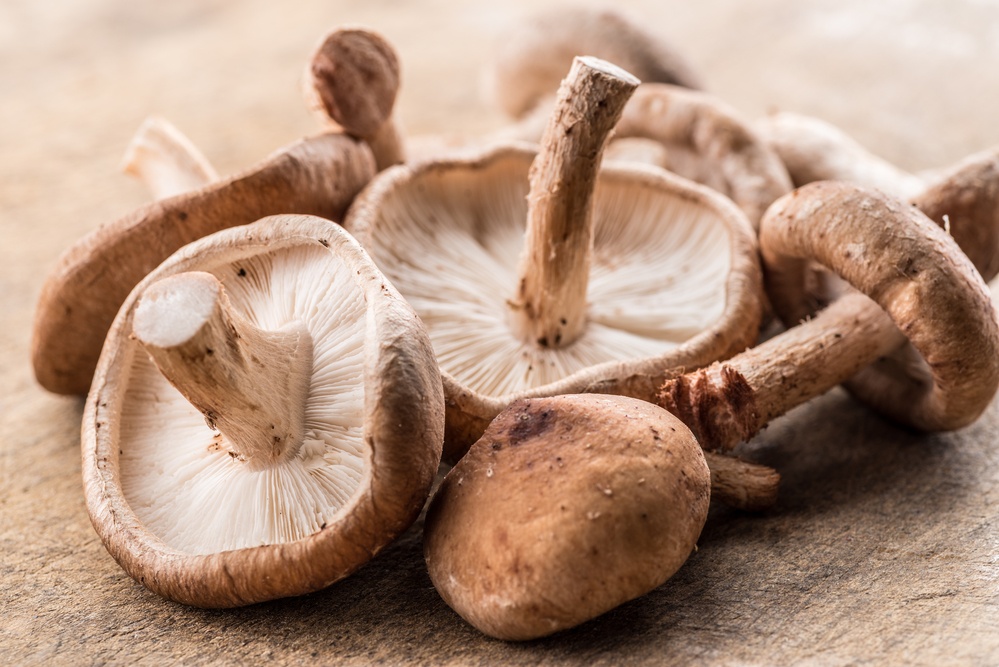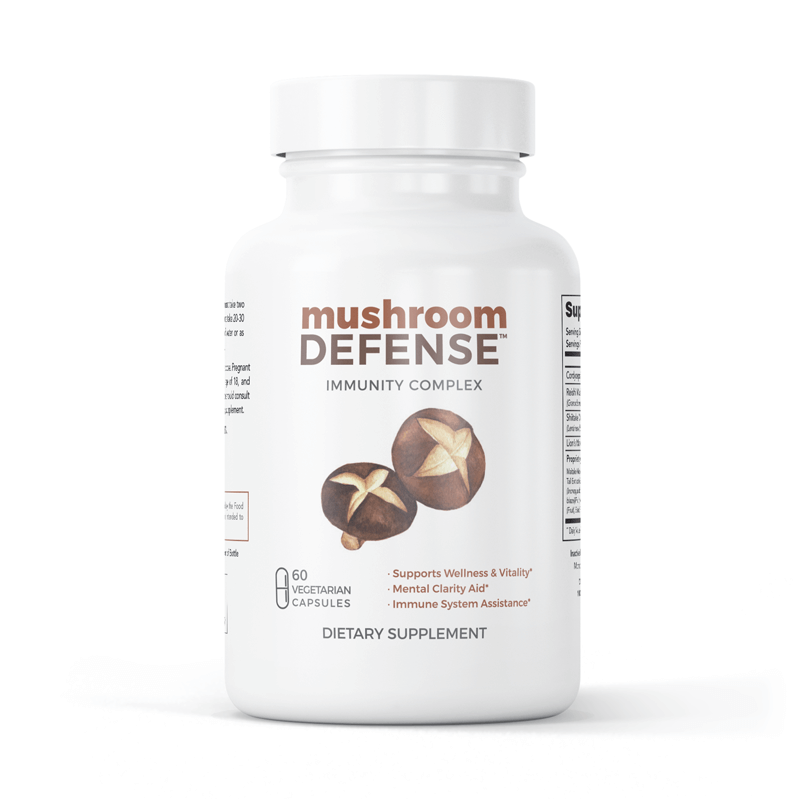You’ve likely heard the health benefits of mushrooms throughout the years, be it from your parents, your high school biology teacher, and/or the ‘health media’ and its infatuation with the superfood of the week.

But are the health benefits of mushrooms for real, and can they actually help your immune system?
In a word, yes. We’re learning more about mushrooms each year and their many health implications, for antioxidants, longevity and their effect on the immune system.
And what we’re learning about the health benefits of mushrooms shows immense promise – although it’s important to choose the right mushroom, because some species are inedible and can even be fatal.
Mushroom Health Benefits: A Growing List
OK, so you might have been scared off by that last statement. But don’t be scared. Think of it like this: to quote Uncle Ben from the first Spiderman film (oh for the days of Tobey Maguire…), “With great power comes great responsibility”.
Mushrooms are fungi[1]. Like seeds or pollen, mushrooms make spores that spread through travel or the wind. And they are absolutely packed with nutrients which, like our favorite elderly ‘uncle-to-a-super-hero’ reminds us, can be used for good purposes or some rather ugly reasons.
As you might imagine, mushroom health benefits come from the mushrooms you can eat – and believe us, those benefits are awesome. They include:
Nutrition
Mushrooms pack a lot of bang for their light calorie hit. They have varying amounts of protein and fibre, along with B vitamins and one antioxidant in particular, called selenium, that has as positive effect on the immune system.
You don’t have to get exotic to benefit from mushroom health benefits related to nutrition either. White button mushrooms, one of the most consumed mushrooms in the world, is one of the few non-animal sources of Vitamin D[2].
Certain Cancers and Dementia
This may be one of the most promising of all mushroom health benefits. Some mushroom species may help fight cancer[3]. Our current understanding of how they do that: mushrooms appear to protect cells from DNA mutation and inhibit tumor formation.
Some mushroom species may even play a role in fighting onset of dementia[4] and mental decline from age.
Heart Health
There is further evidence to suggest that some mushrooms may lower cholesterol in overweight adults[5]. Mushrooms may have phytonutrients that help reduce cells that stick to blood vessel walls, which in turn may reduce plaque build-up and lower your blood pressure in the process.
Mushroom Health Benefits: Raw Or Cooked?
Mushrooms in general are very healthy. Raw mushrooms may be good for the digestive system[6]. But you may get more of the many mushroom health benefits you’ve heard about if you cook them, specifically on a grill or even, ironically, in a microwave[7].
Why a microwave? The short cooking time appears to help mushrooms keep more of their nutrients, especially when compared to boiling or frying them, which has the opposite effect.
So if you want the full mushroom health benefits you’ve heard about, consider putting them in your microwave or grilling them – or think about a mushroom supplement like Mushroom Defense, which we’ll talk about later.
How to Store Mushrooms
Remember this: as a general rule, foods that can go bad are good for you. Foods that don’t go bad are bad for you. Mushrooms are no exception to that. If you buy mushrooms in a store, it’s probably best to leave them in their original packaging.
If you buy loose mushrooms, put them in a paper bag or in a lidded container. If you don’t have a lid, wrap them in plastic and punch a few air holes on the top.
Keep your mushrooms in the fridge, unless you want to boost their Vitamin D content, in which case, put them on your windowsill for one or two hours when their stem-side up, so the underside of the cap is exposed to direct sunlight. That’s a cool ninja trick you likely didn’t know!
We Don’t Recommend Mushroom Foraging
We’ve already touched on the fact that many mushroom species are not edible. They’re ‘not edible’ at best and can have a variety of side effects, including stomach pain, nausea, kidney and liver damage and, well, a slight case of death.
It would be far too easy to pick the happy little mushroom known as the death cap[8] for its benign appearance, but that’s not going to end well.
If you’re still keen to forage for mushrooms, bring photos of edible species with you and be sure to cook them.
Also, if there’s any doubt whether a mushroom is edible, don’t eat it.
6 Healthy Mushrooms That May Help Immune Function
With that clarified, let’s talk about the mushrooms you can eat. Not only that, they’re healthy too[9] – like, really healthy – and may help your immune stay on its tippy toes as you get older.
#1 – Reishi Mushrooms
Feeling a little stressed? Try Reishi Mushrooms. Some people call them ‘Nature’s Xanax’ – Reishi Mushrooms have a compound called triterpene, which may take the edge off a stressful day and help you sleep better. It may help you sleep better too[10], along with weight loss[11] and better immune function[12].
Just as encouraging, Reishi Mushrooms appear to ‘aggressively’ go after cancer cells[13]. Hooray for Reishi!
Potential Benefits:
- Better Sleep
- Less Anxiety and Depression
- Better Focus
How to Eat It: Put a spoonful of Reishi Mushroom in hot tea or add it to a chocolate desert. Yes, really, try it – food allergy permitting.
#2 – Lion’s Mane
Lion’s Mane takes mushroom health benefits to a higher level. Specifically, to your brain. Among other things, Lion’s Mane may help mental clarity, in part because it stimulates a bioprotein, called nerve growth factor (NFG)[14], which is essential to cognitive function.
Lion’s Mane may also boost memory How to Eat It: Add a spoonful of Lion’s Mane to your daily tea, like yerbe mate, for an antioxidant super-boost, with more energy and mental clarity. You can also improve memory and cut brain fog with Brain Pill. Read our review here, “BrainPill is a Nootropic Smart Pill.” Speaking of antioxidants, there are plenty of those in Chaga Mushroom. Chaga helps fight age-accelerating free radicals and inflammation, so you have less oxidative stress[16], lower LDL cholesterol (the ‘bad’ cholesterol) and – possibly – inhibition of some kinds of cancer[17]. Potential Benefits: How to Eat It: You can add Chaga powder to smoothies or your favorite coffee drink, like a Chaga Chai Latte. Shiitake Mushrooms are way up there on the mushroom health benefits list. They may lower LDL Cholesterol[18] (that’s good) and they also appear to help the liver (that’s good too). Now add lower blood pressure[19] to that list and it’s no ‘shiitake’ that Shiitake Mushrooms are good for you. Possible Benefits: How to Eat It: Add a spoonful of Shiitake mushroom powder to your cooking or, what the heck – cook and eat the mushrooms, food allergy permitting. You know those rumors you’ve heard about mushrooms being able to fight off cancer? Research is still very early on that, so don’t get your hopes up. But Turkey Tail Mushrooms appear to be especially promising thanks to a compound called polysaccharide-K (PSK), which seems to put the immune system in high gear How to Eat It: You can add Turkey Tail powder to your smoothies and, we like this – you can even make Turkey Tail mushroom beer[21]! Cordyceps can give you a nice energy boost. It’s a fungus that helps increase energy levels and, rather enjoyable, gives the libido a nice jumpstart too. The reason? Cordyceps helps the body use oxygen more efficiently and helps blood flow throughout the body[22]. That’s a very good thing if you’re active or you hit the gym often. Cordyceps appears to increase exercise performance[23] and may help your muscles recover faster as well. Possible Benefits: How to Eat It: Add Cordyceps to your pre- or post-workout meal to shift your energy levels into high gear and help your muscles recover faster. We’ve covered a lot of ground here, and at this point it’s pretty clear that mushrooms pack a world of health benefits, for your energy, libido and immune function, among other things. Want an easy way to put all these mushroom health benefits in your life, with each of the mushrooms species we’ve discussed? Try Mushroom Defense. Why We Like It: Mushroom Defense is a high impact mushroom immunity supplement. It’s got each of the mushroom species we’ve talked about and may help you stay healthy and be proactive about your wellness. Benefits: Think about Mushroom Defense if you’d like to be proactive about your immune function and wellness and put the All-Star version of the best mushrooms in your body. This is an excellent product, and you may find you have fewer sick days and more energy as a result. Are All Mushrooms Healthy? Mushrooms are packed with nutrients. Some species have more nutrients than others, however, and not all mushrooms are safe to eat. We’re still learning more about mushroom health benefits and the species that show the most health-boosting potential. As we’ve discussed, some of the most promising health mushrooms appear to be Chaga, Turkey Tail, Shiitake, Reishi, Lion’s Mane and Cordyceps. It’s an exciting field to watch. Can Mushrooms Really Prevent Cancer? That is an extremely bold statement, and it is probably not safe to make any conclusions about mushrooms and their ability to inhibit tumors. That said, this is an emerging field, and in clinical studies, some mushrooms species have shown flashes of this ability. Those species include Chaga and Turkey Tail. We have linked to those studies in this article. Why Can’t I Just Pick My Own Mushrooms? You can – but we don’t recommend it because it is far too easy to mistake a safe species with one you can’t eat. For example, the Death Cap Mushroom looks like other, edible mushroom species. But it’s one of the most dangerous of all mushroom species and can lead to low blood pressure, nausea, kidney and liver damage and, yup, it can kill you too. It’s also spreading voraciously across North AmericaKombucha Health Benefits: Yes or No?” to find out whether you should try it too. [1] https://www.bbcgoodfood.com/howto/guide/health-benefits-mushrooms [2] https://www.ncbi.nlm.nih.gov/pmc/articles/PMC5331567/ [3] https://pubmed.ncbi.nlm.nih.gov/22582152/ [4] https://pubmed.ncbi.nlm.nih.gov/24654802/ [5] https://www.ncbi.nlm.nih.gov/pmc/articles/PMC5302426/ [6] https://www.ncbi.nlm.nih.gov/pmc/articles/PMC4056650/ [7] https://www.tandfonline.com/doi/full/10.1080/09637486.2016.1244662 [8] https://www.wildfooduk.com/mushroom-guide/death-cap/ [9] https://www.healthline.com/health/food-nutrition/best-medicinal-mushrooms-to-try#forstress [10] https://pubmed.ncbi.nlm.nih.gov/22207209/ [11] https://www.nature.com/articles/nrgastro.2015.137 [12] https://pubmed.ncbi.nlm.nih.gov/19651243/ [13] https://www.ncbi.nlm.nih.gov/pmc/articles/PMC3585368/ [14] https://pubmed.ncbi.nlm.nih.gov/24266378/ [15] https://www.healthline.com/health/food-nutrition/best-medicinal-mushrooms-to-try#for-brain-health [16] https://www.healthline.com/health/oxidative-stress [17] https://synapse.koreamed.org/articles/1051060 [18] https://pubmed.ncbi.nlm.nih.gov/11520942/ [19] https://pubmed.ncbi.nlm.nih.gov/3443885/ [20] https://bastyr.edu/news/general-news/2012/11/fda-approves-bastyr-turkey-tail-trial-cancer-patients [21] https://www.chelseagreen.com/2015/mushroom-infused-beer/ [22] https://www.ncbi.nlm.nih.gov/pmc/articles/PMC3909570/ [23] https://www.ncbi.nlm.nih.gov/pmc/articles/PMC4174424/ [24] https://science.howstuffworks.com/life/biology-fields/poisonous-death-cap-mushroom.htm#3 – Chaga
#4 – Shiitake Mushrooms
#5 – Turkey Tail
#6 – Cordyceps
Why You Should Think About Mushroom Defense
FAQs





